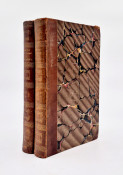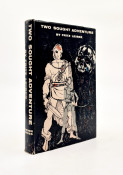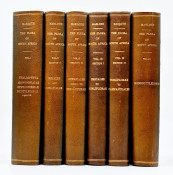Lot of two items;
1) THE MANY FACES OF NELSON MANDELA (Souvenir Stamp-booklet)
A mint condition souvenir stamp booklet No.8 titled 'The many faces of Nelson Mandela'" issued by the South African Post Office in 2001. Contains 10 different Nelson Mandela stamps and 2 postcards. Only 30000 were printed, which as stamps go is a very small print run indeed. Such was the demand for this booklet at the time that it was completely sold out within the first few hours after arrival at many of the post offices throughout South Africa.
Iconic South African leader Nelson Mandela, a man of many faces: Law student; activist; terrorist, prisoner, politician and President. As head of the African National Congress (ANC) he saw the end of South Africa’s system of racial laws, known as Apartheid, and became the beloved President of the newly integrated nation.
Unlike Robert Mugabe of Zimbabwe, Mandela showed restraint, guile and a conciliatory style of diplomacy which, without question, prevented what could have been a civil war and bloodbath, following the end of white rule. The white Afrikaners, descended from Dutch settlers, implemented the apartheid system in 1948. The African National Congress, which had been formed in 1912 as the South African Native National Congress, had been struggling to fight for the rights of blacks and attracted law student Mandela to their ranks. In 1955, he became President of the Transvaal branch of the ANC. In 1961, working in cooperation with the South African Communist Party, he founded the ANC’s paramilitary wing, known as Umkhonto we Sizwe (“Spear of the Nation”) or MK.
Already, Mandela had become a man of many faces. After leading a bombing campaign against the South African government, Mandela was arrested in 1962 for inciting a strike and illegally leaving the country – he had traveled, without permission, to Ethiopia – where he met with other African nationalist leaders – England and Algeria. He was initially sentenced to five years, but was later brought to trial for terrorism-related charges, after he had been linked to the militant activities of the MK. At his trial, Mandela, the former advocate for non-violent protest, justified his turning to violence; “It would be wrong and unrealistic for African leaders to continue preaching peace and nonviolence at a time when the government met our peaceful demands with force. It was only when all else had failed, when all channels of peaceful protest had been barred to us, that the decision was made to embark on violent forms of political struggle.”
For the next 27 years, Mandela was incarcerated at the infamous Robben Island prison and, later, at other locations. During these years, he grew to be a legend, a martyr and a hero for black South Africans. Following his release, it seemed as if he was destined to become, first, leader of the ANC and then President of South Africa. The last of Mandela’s many faces was of beloved elder statesman and “Father of the Nation”. His passing will mark the end of a painful, turbulent and remarkable era for South Africa.
2) THE HATED DOMPAS
One of Apartheid Era's most hated Items', a 'pass book' or 'Dompas' as it was commonly known during the Apardheid Era.
This then is a 'Dompas' that belonged to a Xhosa man who had 'permission' to work in Graaff-Reinet in 1985.
Following Nelson Mandela's example of burning of his own 'Dompas' on March 28, 1960, in protest to the atrocities at Sharpeville, many millions of the infamous 'Dompas' were destroyed in similar fashion, both during the apartheid era in protest to the ongoing atrocities, and also post apardheid in celebration of a new and Free South Africa. As a result, few remain in existance today.
The Natives (Abolition of Passes and Co-ordination of Documents) Act, 1952, commonly known as the Pass Laws Act, made it compulsory for all black South Africans over the age of 16 to carry a 'pass book' at all times within white areas. The law stipulated where, when, and for how long a person could remain. This pass was also known as a 'Dompas'. The document was similar to an internal passport, containing details on the bearer such as their fingerprints, photograph, the name of his/her employer, his/her address, how long the bearer had been employed, as well as other identification information. Employers often entered a behavioural evaluation, on the conduct of the pass holder. An employer was defined under the law and could be only a white person. The pass also documented permission requested and denied or granted to be in a certain region and the reason for seeking such permission. Under the terms of the law, any governmental employee could strike out such entries, basically canceling the permission to remain in the area. A pass book without a valid entry then allowed officials to arrest and imprison the bearer of the pass. These passes often became the most despised symbols of apartheid. The resistance to the Pass Law led to many thousands of arrests and was the spark that ignited the Sharpeville Massacre on 21 March 1960, and led to the arrest of Robert Sobukwe on that same date.
- Sold By: Booktown Africana
- Contact Person: Chris Shelton
- Country: South Africa
- Email: [email protected]
- Telephone: 0685615292
- Preferred Payment Methods: Internet banking transfer (EFT), PAYPAL. Regret no Credit Card facility.
- Trade Associations: AA Approved

Similar lots in the current auction View all
Click on an item to view more details and to bid.





















